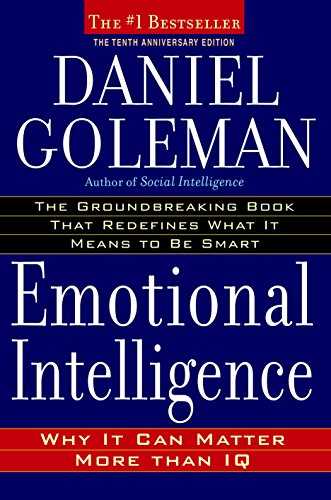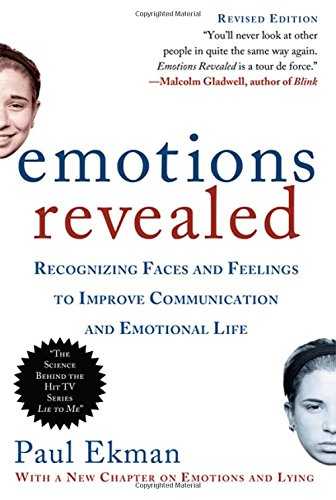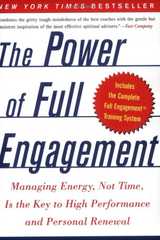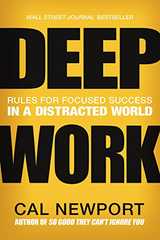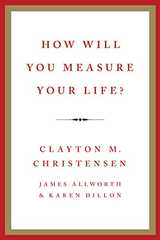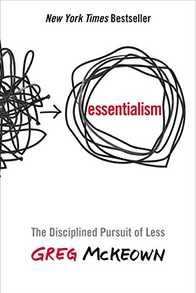
Essentialism: The Disciplined Pursuit of Less
byGreg McKeown
Essentialism at its core is simplifying and focusing on the things that matter. Being essential, is prioritizing and taking back control of your life, if you don't set the boundaries, someone else will and sometimes that means you've got to say no. We can't do it all, so we need to find where we can make the highest contribution to the things that matter.
Motivations to Read
In my quest for productivity, I've found myself taking on more than I can manage and spreading my attention and focus thin. I've been overwhelmed with too many options and distractions. I want to learn more about acquiring an essentialist mindset and better prioritizing all around. Simplicity is hard, so we tend to overcomplicate things because that's ironically easier. Productivity is more than just getting a lot of stuff done; it's also about getting the right things done.
3 Reasons to Read
- Improve your ability to find what is essential; we accomplish more when we are choosier about where we direct our efforts
- You are overwhelmed with distractions, options and want to focus more
- You need to say "No" more
Notable Quotes
If you don't Prioritize your life, someone else will. - Greg McKeown The ability to choose cannot be taken away or even given away it can only be forgotten. - Greg McKeown Our highest priority is to protect our ability to prioritize. - Greg McKeown
Essentialism: The Disciplined Pursuit of Less Notes & Summary
ESSENTIALISM
The way of the Essentialist involves learning to spot and focus on investing time in the right activities.
The way of the Essentialist means living by design, not by default.
Essentialism is a disciplined, systematic approach for determining where our highest point of contribution lies, then making execution of those things almost effortlessly.
Essence: What is the core Mindset of an essentialist?
- Individual choice: We can choose how to spend our energy and time.
- The prevalence of noise: Almost everything is noise, and very few things are exceptionally valuable.
- The reality of trade-offs. We can't have it all or do it all.
The Discipline Pursuit of Less
- Explore: Discerning The trivial many from the vital few.
- Eliminate: Cutting out the trivial.
- Execute: Removing Obstacles and making execution effortless.
The Model
| Nonessentialist | Essentialist | |
| Thinks | All Thing To All People | Less But Better |
| Does | The Undisciplined Pursuit of More | The Disciplined Pursuit of Less |
| Gets | Lives a Life that does not satisfy | Lives a life that really Matters |
The way of the Essentialist is the path to being in control of our choices.
If you don't Prioritize your life, someone else will.
The Paradox of Success
Phase 1: When we really have clarity of purpose, it enables us to succeed at our endeavor.
Phase 2: When we have success, we gain a reputation as a "go to" person. We become "good old [insert name], " who is always there when you need him, and we are presented with increased options and opportunities.
Phase 3: When we have increased options and opportunities, which is actually code for demands upon our time and energies, it leads to diffused efforts. We get spread thinner and thinner.
Phase 4: We become distracted from what would otherwise be our highest level of contribution. The effect of our success has been to undermine the very clarity that led to our success in the first place.
Trends that lead to nonessentialism
- Too many choices
- Too much social pressure
- The idea that "You can have it all"
The word priority came into the English language in the 1400s. It was singular; meaning the very first or prior thing. It stayed singular for the next five hundred years until the 1900s when we started using the term priorities.
Eliminating nonessentials takes mental and emotional discipline.
The ability to choose cannot be taken away or even given away it can only be forgotten.
When we forget our ability to choose, we learn to be helpless.
Nonessentialist: "I have to."
Essentialist: "I choose to."
"You cannot overestimate the unimportance of practically everything." - John Maxwell
They are very few things of exceptional value.
A non-essentialist thinks almost everything is essential.
An Essentialist thinks almost everything is non-essential.
Essentialists prioritize, and when it comes to problems they don't try to do it all, but keep the trade-offs in mind and ask, "Which problem do I want?"
Essentialists use exploration, listening, debating, questioning and thinking to pin-point the vital few from the trivial many.
Create space for yourself to focus.
Keep a journal and reflect on your journey. Review every 90 days and find the patterns in your life that stick out to you.
Ask clarifying questions to get to the signal within the noise.
Play: Embrace the Wisdom of the Inner Child
The word School is derived from the Greek word schole, meaning "Leisure".
- Our educational systems had drifted far away from this.
The ways that Play expands our mind:
- Play broadens the range of options available to us tapping into our curiosity and ingenuity.
- Play reduces stress, enabling us to think more clearly.
- Play improves the executive functions of the brain, those involved in careful logical reasoning and carefree unbound exploration.
Nonessentialist
Thinks:
- Our hour less of sleep equals one more hour of productivity.
- Sleep is for failures.
- Sleep is a luxury.
- Sleep breeds laziness.
- Sleep gets in the way of "doing it all."
Essentialist
Knowns:
- One hour more of sleep equals several more hours of much higher productivity.
- Sleep is for high performers.
- Sleep is a priority.
- Sleep breeds creativity.
- Sleep enables the highest levels of mental contribution.
LOVE THIS
"Our highest priority is to protect our ability to prioritize."
The 90 Percent Rule
"As you evaluate an option, think about the single most important criterion for that decision, and then simply give the option a score between 0 and 100. If you rate it any lower than 90 percent, then automatically change the rating to 0 and simply reject it."
The motivation for this is to snap you out of indecision, to make decisions by design, rather than by default.
He makes another good point, when our selection criteria are too broad, we will find ourselves committing to too many options.
Essentialists say yes to only the top 10 percent of opportunities.
If it isn't a clear yes, then it's a clear no.
Similar to Derek Sivers, No more yes. It's either HELL YEAH! or no.
Motivation and purpose deteriorate when there is a lack of purpose.
Two patterns emerge when teams lack a clarity of purpose:
- Playing Politics: Creating unnecessary games and rules to protect their power, or gain the attention of those in power.
- It's All good(Which is Bad): Everything is up for grabs, there is no real leader, and people pursue their own short-term interests with little understanding of how their activities contribute to the whole.
Essentialist has an intent that is both meaningful and memorable.
Makes one decision that eliminates one thousand later decisions.
Mastering the art of saying no is one of the most important skills to master in becoming an Essentialist.
You need courage, to say No effectively.
One reason we have trouble saying no is that we are unclear about what is essential.
A second reason we are afraid to say no is an innate fear of social awkwardness.
We need to separate the decision from the relationship and find the courage and compassion to communicate it.
Essentialists accept they cannot be popular with everyone all of the time.
How to say No gracefully.
The "No" Repertoire
The awkward pause
Use silence to give yourself time and space to say no.
The soft "no" (or the "no but")
Say no for current demands on your time and energy, but propose some future date when you are more flexible.
Let me check my calendar and get back to you
Use your calendar as a shield; you can later accept or deny the requester.
Use email bouncebacks
Use email autoresponders for more situations than vacation; times where you want to focus deeply.
Say, "Yes. What should I deprioritize?
If you can't say no, due to work obligations or other responsibilities, as for help in reducing your current workload so you can take on the new request.
Say it with humor
Use a more humorous tone in certain situations to communicate your No more non-aggressively.
Use the words, "You are welcome to X. I am willing to Y"
Say what you are willing to help with, to partially fulfill an ask.
"I can't do it, but X might be interested."
Recommend someone else who may be able to help.
"Half of the troubles of this life can be traced to saying yes to quickly and not saying no soon enough." - Josh Billings
"Sunk cost bias is the tendency to continue to invest time, money, or energy into something we know is a losing proposition simply because we have already incurred, or sunk, a cost that cannot be recouped."
Avoiding Commitment Traps
Beware of the endowment effect
The endowment effect is "Our tendency to undervalue things that aren't ours and to overvalue things because we already own them."
Pretend you don't own it yet
To counter the endowment effect pretend you don't own it yet; ask yourself how much would you value it assuming you don't own it.
Get over the fear of waste
Don't be afraid to remove what is non-essential.
Instead, admit failure to begin success
Admit mistakes earlier, to stop yourself from going down a clearly wrong path.
Stop trying to force a fit
Don't try too hard to be something you're not.
Get a neutral second opinion
Seek advice from a rational friend/family-member or trusted advisor when you are too emotionally caught up in a decision.
Be aware of the status quo bias
"The tendency to continue doing something simply because it's always been done."
Apply zero-based budgeting
Every new commitment should justify itself anew, and not make it's way into yourself again because it's always been there. If something in your life no longer fits, remove it.
Stop making casual commitments
Reduce the amount of soft-commitments you make because you're "bored".
From now on, pause before you speak
Pausing gives you extra time to think. Remember that.
Get over the fear of Mission Out
Spend time on the things that really matter to you, not what other people think should matter to you.
To fight this fear(FOMO), Run a reverse pilot
"In a reverse pilot you test whether removing an initiative or activity will have any negative consequences (in your life)."
*Can also be applied to your social life.
"I saw the angel in the marble and carved until I set him free." - Michaelangelo
For a writer, director or other creative craft, editing, disciplined elimination is critical to the craft.
As the famous writer Stephen King said, "kill your darlings, kill your darlings, even when it breaks your egocentric little scribbler's heart, kill your darlings."
The Latin root of the word decision - cis or cid - literally means "to cut" or "to kill."
Four Editing Principles that can be applied to life
- Cut Out Options: Good decision making involves reducing many options to the few critical ones.
- Condense: In writing, condensing helps readers use less effort to get to the core of your ideas. In your life eliminate multiple meaningless activities and replace them with a meaningful one.
- Correct: Course correct your life with a clear intent and core purpose in your activities.
- Edit less: Be cautious of too busy activity and unguided change; do less, when less counts.
Essentialists understand that boundaries protect their time from being stolen from them and reduce the amount of time they have to directly say no.
To protect yourself from other people's agenda
Don't Rob People of their problems
Help people when you can, but make sure they don't just dump their problems on you or welcome to take on their problems.
Boundaries are a source of liberation
Set clear boundaries for your personal time.
Find your deal breakers
Identify people who consistently knock you off your path.
Craft social contracts
Communicate upfront what you are trying to achieve and any boundaries you have.
"Give me six hours to chop down a tree and I will spend the first four sharpening the axe." - Attributed to Abraham Lincoln
"Once you've figured out which activities and efforts to keep in your life, you have to have a system for executing them."
An Essentialist using good times to create a buffer for the bad.
If you find yourself consistently late, or underestimating time, add a 50% buffer to your estimate.
"Essentialists accept the reality that we can never fully anticipate or prepare for every scenario or eventuality; the future is simply too unpredictable. Instead, they build in buffers to reduce the friction caused by the unexpected."
How the essentialist removes constraints or obstacles
Be clear about the essential intent
You need to know your desire outcome, before you can truly understand what's blocking you.
Identify the "slowest hiker"
Ask yourself, "Why is the obstacle that, if removed, would make the majority of other obstacles disappear?"
Remove the obstacle
Do what you need to do to remove the obstacle. Sometimes that means making other cuts in other area to free up time and energy.
"Every day do something that will inch you closer to a better tomorrow." - Doug Firebaugh
Nonessentialist
Starts with a big goal and gets small results
Goes for the flashiest wins
Essentialist
Starts small and gets big results
Celebrates small acts of progress
Nonessentialist
Tries to execute the essentials by force
Allows nonessentials to be the default
Essentialist
Designs a routine that enshrines what is essential, making execution almost effortless
Makes the essential the default position
"The ancient Greeks had two words for time. The first was Chronos. The second was Kairos.[..] Chronos is quantitative; Kairos is qualitative."
"The way of the Essentialist is to tune into the present. To experience life in the kairos, not just chronos. To focus on the things that are truly important - not yesterday or tomorrow, but right now."
How to Be in the Now
Figure put what is most important right now
Pause, bring your attention to the present and ask yourself what is the most important thing right now.
Get the future out of your head
The future hasn't come yet, and you take up too much focus, focusing on it.
Prioritize
Ask yourself what is essential now.
The disciplined pursuit of less gives you more clarity, more control and more joy in the journey.
"The life of an Essentialist is a life of meaning. It is a life that really matters."
